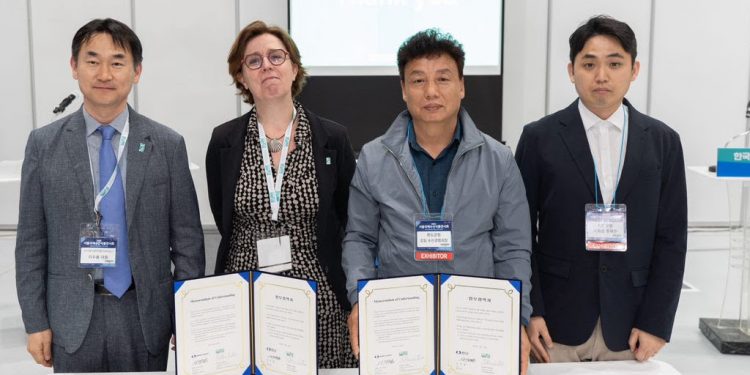In line with the growing supply and demand of responsible aquaculture in Asia, the Aquaculture Stewardship Council (ASC) has stepped up its presence in South Korea.
ASC’s work in the country is already well established and is gaining strength steadily. There are now 73 ASC certified farm sites in South Korea—28 seaweed, 44 abalone and one shrimp, with overall annual ASC certified volumes of more than 11,000 tonnes. The largest number of ASC labelled seaweed and abalone products globally are farmed in South Korea.
‘The uptake of responsible seafood farming practices in South Korea is a boon for responsible aquaculture in Asia and around the world,’ said Esther Luiten, ASC’s Global Market Development Director.
‘South Korean distributors and brands like CJ Freshway, IKEA, Lottemart and Olga have made commitments to ASC certification that are creating real change in the retail market.’
Late last year, ASC brought onboard a general manager to head operations in South Korea—Martin Lee, who came to ASC with robust experience in market development in sustainability sectors in Asia, including sustainability certifications.
‘I’m very pleased to see how ASC certification is making South Korean aquaculture products more competitive within the global market,’ said Martin Lee.
‘South Korea is a major producer of seaweed, and ASC certification is giving Korean farms a way to meet international market demands for seaweed that is responsibly produced.’
Industry interest in ASC certification was apparent at the first Korea Sustainable Aquaculture Seminar, held on 28th April 2023 in Seoul and co-hosted by ASC and Aquainfo Co., Ltd., a major South Korean aquaculture magazine.
More than 85 attendees from South Korean farms, seafood suppliers, retailers, local governments and more gathered during the event to discuss the benefits of responsible aquaculture for the environment and local communities.
At the event, a memorandum of understanding was signed by ASC and Wando-gun, a county on South Korea’s southern coast that has been an active supporter of responsible seafood farming. The MoU is an agreement for collaboration ‘with mutual efforts to develop responsible aquaculture industry” and ‘to promote understanding of responsible aquaculture to the market and consumers.’
‘The signing of the MoU between ASC and Wando-gun is a significant event. Through this agreement both organizations will cooperate to develop sustainable aquaculture,’ said Woo-cheol Shin, Mayor of Wando County.
‘We believe that ASC certification is important for the development of the aquaculture industry in Wando-gun and for the promotion of our farmed seafood products in South Korea and internationally.’
Two players in the South Korean aquaculture industry were given awards by ASC at the Korea Sustainable Aquaculture Seminar: Eunha Marine and Chungsanbada. Eunha Marine was awarded for its leadership in promoting ASC certified products to South Korean processors and distributors. In 2020, they also launched the first ASC labelled salmon product on the South Korean market.
Chungsanbada, or the Chungsan Fishermen’s Organization, is an abalone farm operation that was awarded for its commitment to responsible practices and becoming the first ASC certified producer in South Korea, back in 2018.
‘Efforts by Chungsanbada corporations and fishermen to create a sustainable abalone industry have created awareness of responsible aquaculture in Korean society,’ said Chungsanbada CEO Jiyeon Wi.
‘Thanks to the support and encouragement of WWF Korea, the Ministry of Oceans and Fisheries and the Wando County Office, it was possible to achieve our successful ASC certification. We would like to express our gratitude to the distributors and consumers who choose seafood that is responsibly produced.’









